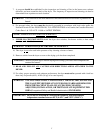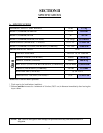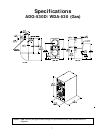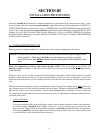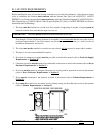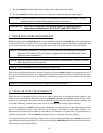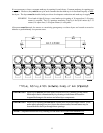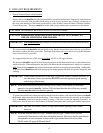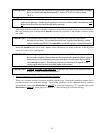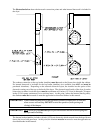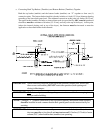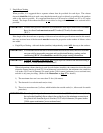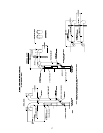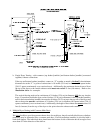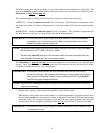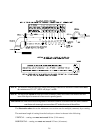
13
IMPORTANT: Exhaust back pressure measured by a manometer at the dryer exhaust duct area must
be no less than 0 and must not exceed 0.3 inches (0.74 mb) of water column
(W.C.).
NOTE: Careful consideration should be given to where the exhaust duct is located in relation to the
make-up air openings. If make-up air opening is too close to exhaust outlet, lint and fumes will
be drawn back into the dryer area through these openings.
If the length of the ductwork run or quantity of elbows used exceeds the specifications noted in this booklet,
the cross-sectional area of the ductwork must be increased in proportion to the number of elbows or duct
run added.
IMPORTANT: For extended ductwork runs, the cross-sectional area of the duct can only be
increased to an extent. For extended ductwork runs, a professional heating, venting,
and air conditioning (HVAC) firm should be consulted for proper venting information.
Ductwork should be laid out in such a manner where allowances are made at the rear of the dryer for
removal of rear service panels/guards.
IMPORTANT: Even though the dryer’s exhaust outlet size is 6-inches (15.24 cm) in diameter (at both
the top basket [tumbler] damper duct and the bottom basket [tumbler] elbow where it
leaves the dryer), the minimum connection at the point of exit from the dryer in ALL
cases must be increased. The amount of increase in diameter will depend on the
venting application/layout as described further in this manual.
IMPORTANT: UNDER NO CIRCUMSTANCES can the dryer be vented to the outdoors using a
6-inch (15.24 cm) diameter exhaust duct!!!
2. Exhaust Connections of Top and Bottom Baskets (Tumblers)
There is no common venting connection provided with the dryer. Each basket (tumbler) exhaust duct is
provided with its own back draft damper. Each basket (tumbler) can be exhausted directly outdoors
independently (refer to the illustration on page 17) or connected commonly (“Y”) together (refer to the
illustration on page 18). Both single or common “Y” duct can be rigid or flexible ducting.



